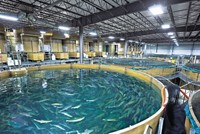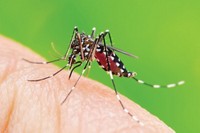Advertisement
Grab your lab coat. Let's get started
Welcome!
Welcome!
Create an account below to get 6 C&EN articles per month, receive newsletters and more - all free.
It seems this is your first time logging in online. Please enter the following information to continue.
As an ACS member you automatically get access to this site. All we need is few more details to create your reading experience.
Not you? Sign in with a different account.
Not you? Sign in with a different account.
ERROR 1
ERROR 1
ERROR 2
ERROR 2
ERROR 2
ERROR 2
ERROR 2
Password and Confirm password must match.
If you have an ACS member number, please enter it here so we can link this account to your membership. (optional)
ERROR 2
ACS values your privacy. By submitting your information, you are gaining access to C&EN and subscribing to our weekly newsletter. We use the information you provide to make your reading experience better, and we will never sell your data to third party members.
Biotechnology
US EPA amends genetically modified mosquito permit
Agency allows experimental releases in parts of Florida and California until 2024
by Britt E. Erickson
March 10, 2022

The US Environmental Protection Agency has given UK-based Oxitec a 2-year extension to release genetically modified mosquitoes in Monroe County, Florida.
The agency also expanded the company’s experimental use permit to allow release of the mosquitoes in four California counties. The company plans to start with a project in Tulare County and possibly expand to the other three counties at a later date.
Oxitec is testing whether the release of genetically modified Aedes aegypti mosquitoes can help reduce the pest’s population. A. aegypti mosquitoes transmit diseases such as Zika, chikungunya, and dengue. The company releases non-biting male A. aegypti mosquitoes that have been genetically modified to produce a protein that keeps their female offspring from surviving.
The EPA first granted Oxitec a permit in 2020 to conduct the tests in Florida. That permit was set to expire in April. The agency has now extended the permit through April 2024.
The EPA also expanded the permit to allow Oxitec to test the genetically modified mosquitoes in California. The expansion will allow the company to generate data in different climates.
“Given the growing health threat this mosquito poses across the U.S., we’re working to make this technology available and accessible,” Oxitec CEO Grey Frandsen says in a statement. “These pilot programs, wherein we can demonstrate the technology’s effectiveness in different climate settings, will play an important role in doing so,” he says.
Oxitec is working on two new pilot projects with the Delta Mosquito and Vector Control District in central California and the Florida Keys Mosquito Control District. The company still needs approval from state regulators in California and Florida to proceed.
Some environmental and public health groups question why the EPA is allowing the experiments in California. “This experiment is unnecessary and even dangerous, as there are no locally acquired cases of dengue, yellow fever, chikungunya or Zika in California,” Jaydee Hanson, policy director for the International Center for Technology Assessment and Center for Food Safety, says in a statement.





Join the conversation
Contact the reporter
Submit a Letter to the Editor for publication
Engage with us on Twitter